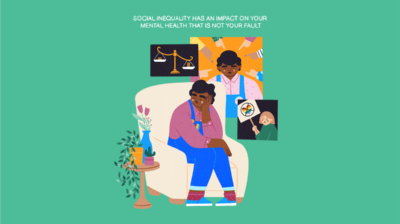Understanding the link between resilience and mental health
Understand the relationship between resilience and positive mental health.

Building resilience isn’t easy, but it’s a rewarding process that can help protect your mental health when you face life’s inevitable challenges. In this factsheet, you will find information on the benefits of resilience, how resilience relates to mental health, and some of the common barriers to strengthening resilience.
To learn more about how to develop and strengthen resilience, visit our article on building resilience.
What are the benefits of resilience?
Resilience is a set of inner resources and skills, such as positive behaviours and attitudes, that help you adapt to changes and handle challenges. While dealing with setbacks and recovering from stressful or traumatic experiences can take time and patience, resilience helps you bounce back by using positive coping strategies. Instead of turning to harmful methods like substance misuse or disordered eating, people who develop resilience focus on understanding and addressing the root cause of issues and their emotional impact. In other words, resilience means taking proactive steps to tackle difficulties rather than avoiding them.
What you need to know about resilience and mental health
Research shows that there is a strong link between resilience and positive mental health. Some of us have mistaken ideas of what resilience really means. Here’s a clarification of what resilience is and is not:
- Resilience can be learned: Resilience isn’t something you’re simply born with—there’s no “resilience gene.” Instead, resilience can be developed by learning and practising certain skills and adaptive coping strategies
- Resilience does not eliminate pain or setbacks: People who develop resilience are not immune to challenges or misfortune. Like everyone else, they face setbacks. What sets them apart is their ability to address these setbacks effectively and manage the resulting stress in a constructive and self-compassionate way, rather than letting the setbacks increase their suffering
- Resilience is not about numbing emotions: Being resilient doesn’t mean blocking out emotions. People who develop resilience actively engage with their feelings, tolerate them long enough to understand and make sense of them, and reflect on their responses. They have emotional regulation skills and accept the challenge of feeling deeply
- Resilience is not a substitute for seeking help: Resilience cannot replace the need for human connection and support. Even the most resilient person may need to reach out to trusted people or professionals, especially in the face of trauma or severe emotional distress. Recognising when professional help may be necessary is a key aspect of resilience, and seeking support can prevent crises and promote overall well-being
The relationship between resilience and mental health
Resilience strengthens your ability to cope with the build-up of everyday stress and unexpected stressful or traumatic events, and reduces your risk of developing more serious mental health challenges.
By developing the skills and mental attitudes associated with resilience, you may find yourself coping more effectively with major life challenges, like job loss or a relationship breakup. Having good coping mechanisms can help prevent your emotional distress from becoming a more serious mental health condition that might require treatment.
Common barriers to resilience
Different people may experience multiple barriers to developing greater resilience. Some people face more of these barriers than others, with factors combining and interacting to produce unique challenges in a person’s life. Despite these challenges, it’s important to remember that growing your resilience is always possible, regardless of your circumstances.
Below is a list of some of the common barriers to resilience you and others might face:
- Experiencing loneliness: Lack of social support and connections can make it harder to cope with stress and adversity
- Housing instability: Homelessness and uncertainty about housing can lead to high levels of stress. Homelessness can also make it more difficult to develop the skills associated with personal resilience
- Poverty: Financial difficulties can limit access to resources and opportunities that support resilience
- Discrimination: Facing unfair treatment based on race, gender, sexuality, or other factors can undermine self-esteem and increase stress
- Chronic illness and/or physical disability: Ongoing health challenges can create additional stress and reduce your capacity to manage other life difficulties
- Long-term mental health difficulties: Long-term mental health difficulties can make it harder to develop and maintain resilience
- Being a carer: The demands of caregiving can limit personal time and resources. Caregiving can also negatively impact a person’s ability to focus on self-care and resilience
No matter what barriers you face, building resilience in your own way and at your own pace is possible. Developing resilience can improve your overall sense of wellbeing and confidence in tackling difficult situations and recovering from them. For more information and guidance, take a look at our factsheet on how to build resilience.
Feeling overwhelmed and want to talk to someone?
- Get anonymous support 24/7 with our text message support service
- Connect with a trained volunteer who will listen to you, and help you to move forward feeling better
- Whatsapp us now or free-text SPUNOUT to 50808 to begin.
- Find out more about our text message support service
If you are a customer of the 48 or An Post network or cannot get through using the ‘50808’ short code please text HELLO to 086 1800 280 (standard message rates may apply). Some smaller networks do not support short codes like ‘50808’.






